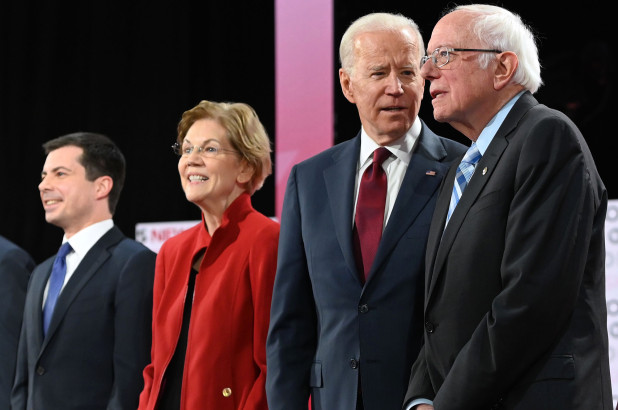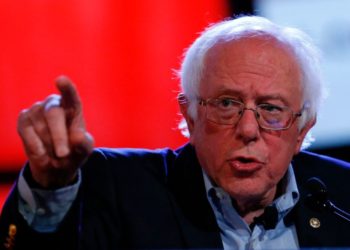For many, the major story coming out of Wednesday night’s Democratic presidential debate in Las Vegas was the rocky performance of newcomer Michael Bloomberg.
After jumping into the contest late and spending hundreds of millions of his own dollars to bolster his campaign, the billionaire former mayor of New York struggled to fend off a torrent of criticism from his opponents – particularly from Elizabeth Warren – who hammered him on his treatment of women and his record on race.
President Donald Trump called Bloomberg’s performance “the worst in the history of debates,” while some Democratic Party insiders and media pundits raised serious doubts over whether his campaign can be taken seriously moving forward.
But there was another, less noticed moment Wednesday night that could also have major implications for the race.
Toward the end of the debate, moderator Chuck Todd asked each candidate a simple question: if no candidate wins a majority of delegates, should the person with the most delegates be the nominee?
In what may have come as a surprise to many voters, every candidate except for Bernie Sanders said no, not necessarily.
“There’s only one guy up there who believes he’s going to have the most delegates going into [the convention],” NBC’s Chris Matthews said following the debate. “That was so telling tonight.”
Sanders won the most votes in the first two primary contests in Iowa and New Hampshire and is considered a clear favorite to win Saturday’s Nevada caucuses.
The Independent Senator from Vermont also commands a 10 point lead over his nearest rival, former Vice President Joe Biden, in the Real Clear Politics aggregate of national polls.
The polling analysis organization FiveThirtyEight estimates Sanders currently has a 37 percent chance to win the nomination outright, far above the chances of any other individual candidate.
But the person with the highest chance of winning a majority of delegates going into the convention in July is “no one,” the analysts say.
On the stage Wednesday, no candidate besides Sanders would commit to supporting the nomination of the person with a plurality of delegates in that scenario.
https://twitter.com/NathanielKFoley/status/1230517110528512000?s=20
Biden, for example, said that the party should “let the process work it’s way out,” while Bloomberg said that “whatever the rules of the Democratic Party are, they should be followed.”
But what exactly are those rules? If no candidate has a majority, what is the process for naming a nominee?
A Contested Convention, Explained
In most American primary elections, the leading candidate wins a majority of delegates and automatically becomes the party’s nominee.
But because of the protracted size of the field this year, it’s more likely than not that no one will reach that 50 percent threshold.
Delegates are awarded, roughly proportionately, by the number of votes each candidate receives in each state.
At the end of the contest, all 3,979 delegates come together at a convention to officially name the winner. This year’s convention will be held in Milwaukee from July 13-16.
On the first ballot, all delegates are “pledged,” meaning they’re bound to vote for the candidate they’ve been assigned to based on the results of the primary elections.
But if no candidate reaches a majority on the first ballot, the convention becomes “contested” and moves into a second round, where 771 unpledged “superdelegates” will join the fray.
Bernie w/ a bit of a warning shot, tells @chrishayes it would be "very divisive" if a candidate gets a clear plurality but not majority of the delegates and the party doesn't nominate that person at the convention. pic.twitter.com/2i3Ei1EXo0
— Alex Thompson (@AlexThomp) February 13, 2020
Unaccountable to the electorate, superdelegates are appointed by the party and are free to support whomever they like.
As Pew Research put it, they are “the embodiment of the institutional Democratic Party” and are made up of “everyone from former presidents, congressional leaders and big-money fundraisers to mayors, labor leaders and longtime local party functionaries.”
Following the tightly contested and controversial 2016 primary between Sanders and Hillary Clinton, the Democratic National Committee changed the rules so that superdelegates could no longer vote on the first ballot.
The rules change was pushed for by Sanders’ supporters, who felt that superdelegates were fundamentally undemocratic and that they had unfairly “rigged” the primary by publically backing Clinton almost exclusively, even before any votes had been cast.
While Sanders’ camp wanted to abolish superdelegates entirely, the two sides ultimately reached a deal allowing them to weigh in only in the case of a contested convention.
Further, some pledged delegates are “released” in the case of a second or third ballot, depending on the laws of each particular state.
With both superdelegates and released delegates coming into play after the first ballot, the convention could theoretically be “brokered,” meaning the various candidates and party leaders could make a deal to name a nominee, regardless of whether or not that person won the most votes.
‘Parties Don’t Recover From That’
There is little precedent for such a scenario in modern political history outside of the infamous 1968 Chicago Democratic National Convention, where Hubert Humphrey was awarded the nomination despite not competing in any primary elections.
The fiasco resulted in bloodshed, as angry, predominately young protesters were attacked by Chicago police officers. Humphrey went on to be defeated handily by Richard Nixon.
Now, Sanders supporters are warning that another contested convention could be equally disastrous for the party.
It’s no secret that there is open animosity between the Sanders faction of the party and its more moderate wing.
Politico reported in January that party insiders were “tormented over how to stop Bernie,” while Sanders has been clear about his intention to take on the “Democratic establishment.”
If Sanders indeed wins a plurality of delegates and is denied the nomination in Milwaukee, some have raised concerns that it would irreparably divide the party.
“If Bernie enters the convention with a plurality of delegates and leaves without the nomination, it will destroy the Party, alienate a generation of Democrats, and hand another four years to Trump,” Sam Adler-Bell, a progressive writer and podcast host, wrote on Twitter Thursday.
Kyle Kulinski, a co-founder of Justice Democrats and an influential left-wing podcast host, went further.
“If democratic elites really think they’re gonna casually override the will of the voters they have another thing coming,” he said. “There will be a million angry people in the streets demanding justice. Don’t try us.”
https://twitter.com/aishaismad/status/1230357662581305344?s=20
Prior to the debate, Sanders himself warned that a brokered convention would be “divisive.”
“The convention would have to explain to the American people, ‘hey, candidate X won the most votes … but we’re not going to give him or her the nomination. I think that would be very divisive for the Democratic Party,” the Senator told MSNBC last week.
Still, other candidates, such as Warren, doubled down on their position that they won’t necessarily support the nomination of the delegate-leader at the convention.
“We need to pick a nominee who can beat Donald Trump and that means we gotta have someone who is talking to all parts of the party,” Warren told MSNBC Thursday, taking an apparent shot at Sanders.
But others outside of the Sanders camp have also raised concerns over the effect of a brokered convention.
Following the debate, David Plouffe, who managed Barack Obama’s 2008 campaign, said such an outcome would cause lasting damage for the party.
“Even if someone has [only] a 50 to 100 [delegate lead], we’re really going to take the nomination away from them in Milwaukee? I’m not sure the party recovers from that for decades,” he told NBC’s Chris Hayes.
“The party bosses have decided that the person who got the most delegates is now not going to be the nominee? Like, parties don’t recover from that for a long time.”
More on the Subject
Podcast Host Benjamin Dixon Puts Bloomberg’s Record on Race, Policing Under Scrutiny























